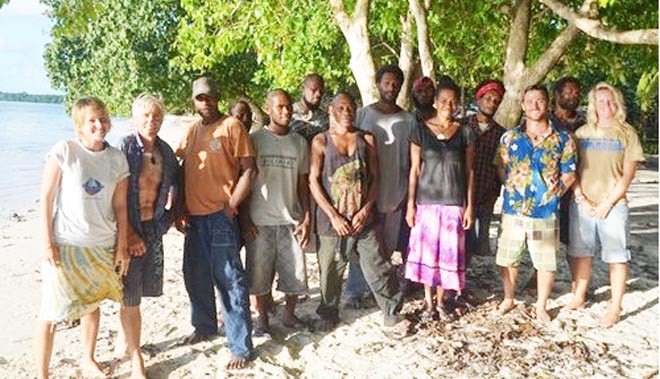OceansWatch training pays off for sustainability in the Solomons.
by Chris Bone/Sail-World Cruising on 17 Mar 2013

There’s always a welcome on Pacific Islands - Tuwo Reef Guardians SW
Chris Bone, inspirational leader of OceansWatch, an organisation of sailors who help islanders of the Pacific where they sail to cope with their changing environment and climate change, speaks here about the challenges of 'making a difference'.
It can be very hard to show that we are actually achieving success towards sustainability, especially to hard nosed grant making bodies.
They want the hard facts, comprehensive surveys costing thousands of dollars that frankly OceansWatch would rather spend on grass roots conservation.
Yet there are other ways to show our impact...
OceansWatch works in the Temotu district of the Solomon Islands which was hit recently by a devastating Tsunami. Villages where we work lost houses and many had their precious cooking utensils washed out to sea. People are in a very difficult situation, vegetable plots are likely to have been washed away or salt intrusion will have limited growth, wells will also have been affected by salt water intrusion. People need money to buy food and other essential supplies, yet they have no money.
OceansWatch has run a fundraiser and is sending building materials and cooking utensils yet we know it's not enough.
A source of income in the area has been the harvesting of Sea Cucumbers. Over the last 100 years the Sea Cucumber stocks in the South West Pacific have dropped radically as local people have sold stocks to Asian buyers. There was big money in the trade but now Sea Cucumber numbers are scarce and a few years ago the Solomon Islands government finally banned harvesting to ensure that they were not wiped out.
Sea Cucumbers take years to replenish, surveys show that even after 30 years stocks can not regain natural population densities and many species have been reduced below their tipping point, individuals are so scarce that they can no longer meet each other to sexually reproduce so have to resort to asexual division, which unfortunately is not fast enough to retain numbers.
During our last trip to the Island of Fenualoa in the Solomon Islands we surveyed Sea Cucumbers. Our survey covered 6 kilometres of ideal Sea Cucumber habitat that in its natural state could have sustained several Sea Cucumbers per square meter. So how many did we find? just sixteen over the whole area. I do not pretend to be a marine scientists but if asked to describe the Sea Cucumber population in the area I think 'Critically Endangered' would be a fair description.
A key component of how we work at village level is our Reef Guardian program. This program educates and empowers a team of local conservation minded fishermen to monitor the health of their marine ecosystem and guide their community on how to ensure the sustainability of the resource.
Because of the recent Tsunami the Solomon Islands government has just lifted the ban on harvesting Sea Cucumbers. This allows local people to collect and sell any Sea Cucumbers they find in a totally unregulated manner. Populations could be wiped out and with no Sea Cucumbers left the ecosystem as a whole will suffer. This is because of the essential role they play cleaning and aerating the substrate, thus constraining harmful algal growth and ensuring a suitable habitat for invertebrates, which in turn provide food for bottom feeding fish.
The OceansWatch trained Reef Guardians now understand the important place Sea Cucumbers have in the community owned reefs and also know that they have a responsibility to their community to take care of them. So instead of rushing out in their canoes to harvest these Reef Guardians had a meeting and through their recently gained knowledge they very wisely decided NOT to harvest the Sea Cucumbers.
These Reef Guardians now understand what real sustainability means, they see that in the long term, having a viable breeding population of sea cucumber is far more important than short term gain of just a few dollars. Well done to the 2012 Oceanswatch Marine Team for empowering them to take this stand.
To participate in OceansWatch projects contact chris@oceanswatch.org
If you want to link to this article then please use this URL: www.sail-world.com/107573

-202504070859.gif)